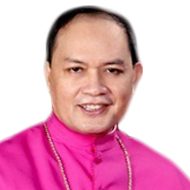612 total views
Homily for the 32nd Sun in OT, 7 November 2021, Mark 12:38-44
Every now and then I get to see on Youtube some videos that they call “social experiments”. There was this one I saw recently of a rich man who pretended to be a homeless guy in the streets of an American city. In the video he is shown approaching a street dweller in his shabby clothes and asking, “Hey man. Have you got some food there? Am really hungry and I haven’t eaten in two days and I’m feeling cold.”
The homeless guy instantly gets his bag and takes out a paper bag with a sandwich in it and some cold French fries. He says, “This is all I’ve got, man; I saved it for lunch. But I can split it in two and you can have have half of it. Is that ok, man?” He splits the sandwich and gives it half of it to him and the two of them eat together. He also gets his thermos and pours into a cup and says, “This is just hot water man. Sorry I have run out of three-in-one instant coffee, but this can warm you up.”
After eating, the man doing the experiment reveals himself and says he’s not really a homeless guy. He was just doing a little social experiment to see if a street dweller would help a fellow homeless guy.
The guy doing the video from a distance now approaches and says, “We have a bag a groceries for you, man. We admire you for being ready to help another homeless guy when you are just as needy yourself.” The man says, “Who else would? Other people are afraid of us.”
The man ended by addressing his viewers, asking a question which he has no answer for: “How come the poor are more ready to help their fellow poor?” I think the answer to that is: “Because those who have means will usually tend to view the needy who ask for help with suspicion. There are greater chances of them being prevented from responding charitably because they would tend to entertain doubts like, “For all I know, this guy is just taking advantage of me. He’s probably a lazy bum. If I give him money he might just use it for buying some alcohol or drugs, or use it for gambling.”
But the street dweller has experienced what it means to be hungry and cold and homeless. Most of all, he also knows what it’s like to be looked at with suspicion, that he might be an alcoholic, or a mentally disturbed guy, or a snatcher. Because he is no stranger to poverty, he can put himself in the position of his fellow poor and homeless.
Today’s readings remind me of the interesting Tagalog word for generous: BUKAS-PALAD. I know that it is also an English expression, as in OPEN-HANDED. But the Tagalog image of the “palad” or the open hand is versatile in meaning. We also refer to the poor as KAPOS-PALAD, to the fortunate ones as MAPALAD, and to one’s fate or lot on earth as KAPALARAN. And when people feel like miserable failures, they call themselves SAWIMPALAD.
I was even surprised to find out that SAWIMPALAD in Tagalog is also used as a curse or a word of denunciation, as in “Sawimpalad kayo!” It is one of the Tagalog translations for the typical opening lines for prophetic oracles of judgment: “Woe to you!” And this, by the way, is the original context of our Gospel.
People often focus only on the so-called “widow’s mite”, they often forget that in the first half of the Gospel Jesus is pronouncing a word of denunciation on those who take advantage of the poor. He does not mince words in his description of the scribes as those who “devour the houses of widows”.
The poorest of the poor in the biblical times were the widows and orphans, or those who had been deprived of their family’s breadwinners at such a young age, such as the wives of soldiers who have died in battle. Their widowed wives and orphaned children were usually the ones who were reduced to slavery or prostitution.
Mark also tells us that the ones who exploit them are even the kind who “recite lengthy prayers”, meaning, the kind who seemed very pious or very religious. People who do not see a disconnect between their abusive behavior towards the poor, and their religiosity.
Remember how I also noted this in my homily the other day? I called attention the other day to that tendency on the part of some believers to dichotomize between the spiritual and the material concerns. The type who think that faith is a matter of building enough spiritual capital that will compensate for their moral deficit. Jesus is denouncing them in the first part of our Gospel. Like an angry prophet he says about them, “They will receive a severe condemnation.” In Tagalog, he would have said, “Akala nila MAPALAD sila. SAWIMPALAD sila!”
The ones that come to my mind, who come close to the description of the behavior of the scribes are pious political candidates who engage in VOTE BUYING. Why? Because like the scribes in the Gospel, they also take advantage of the poverty of the poor. They give, not just “with strings attached” but with ropes and chains attached to their dole-outs. In fact the better analogy for the money they give is bait for catching fish “paen sa pagbibingwit ng isda.” (Paen na tumutusok sa bituka ng mga dukha.) They bait on the hungry stomachs of the poor, and put the poor in a kind of no-choice situation.
If the poor don’t accept the money that the vote buyers offer them, that would be as good as identifying their political sympathies and endangering their families. In fact when they refuse the offer, they are sometimes even offered a bigger price just to stop them from voting.
On the other hand, if they accept the offer, they know that they are compromised. They become almost paranoid about being found out in case they fail to deliver the votes that the vote-buyers have bought from them. In English they call it a DAMN IF YOU DO, DAMN IF YOU DON’T kind of a situation.
And so you see why I say Jesus would reserve the harshest words of denunciation against them?
Thank God, the second part of the Gospel is more positive. That’s the part about the generosity of the poor. In both our first reading and the Gospel, the image of the generous poor is that of a widow: the widow who shares her last bit of food to the prophet Elijah, and the widow who gives her two copper coins to the temple treasury.
In Hebrew, the image that is used for blessedness is not the PALAD or the palm of the hand, but the TALAMPAKAN, the sole of the foot. Perhaps that is because they believe that a person’s fate depends very much on where our feet lead us to. But for us Filipinos, the metaphor for blessedness is the open hand. The opposite, the closed hand, is our typical image for those who are stingy or tight-fisted.
But is not the same open hand also symbolic of poverty and desperateness? It can be an image of begging for help. So how can it be a symbol of good fortune? In our first reading, the Lord taught Elijah to beg from a poor widow. For people who are hardworking, it can be a very painful thing to have to beg. It hurts one’s personal pride.
I recall the experience of a priest whose family found themselves in an evacuation center when Pinatubo erupted and he was still a seminarian. He said he did not want to line up for relief goods because he felt it was so humiliating to do so. Until his mother taught him a lesson—that when people are in need, it is not time for them to be proud. You will not be able to get by—his mother said— if you don’t have the humility to admit that you are in need. So open your hand—both in humility and generosity, both in poverty and in plenty.
Meaning, you open your hand to receive grace; but you must keep your hand open and be ready to share it if you want it to multiply and overflow. It stops being grace the moment you close your hand and keep it only to yourself. Grace begets grace, generosity begets generosity. The truly blessed ones are those who can genuinely appreciate the sincere gifts of the poor, and the poor who can share even from their poverty.
The slogan from Pondo ng Pinoy says this beautifully. “Nobody is ever so poor as not to be able give anything, and nobody can be so rich as not to be able to receive anything.” The truly blessed ones in this world are those who, when they receive blessings, become themselves blessings to the world. Those with a strong sense of grace are those who say “There is nothing that I have that is truly mine, nothing that I did not receive as grace. I came naked into this world and will bring nothing with me to the next life.”
Gratitude is an attitude of the mind, basically a keen sense of grace. It is about being quick to recognize grace and being ready to share it. Sometimes generous people are jokingly described as “galit sa pera”. They don’t cling too much to material wealth. They don’t mind spending it on things considered immaterial but which, for them, truly matter. They know how to invest not just materially but also spiritually. You see, wealth is such a relative thing. For Jesus, a donation worth millions is not necessarily of greater worth or value than the twenty pesos dropped by a poor hardworking laborer in the collection basket.
St Paul says, in 2 Corinthians 9:6-8 “…whoever sows sparingly will also reap sparingly, and whoever sows bountifully will also reap bountifully. Each one must do as already determined, without sadness or compulsion, for God loves a cheerful giver.” This is the passage that has set the tone for the spirit of stewardship in the Church.
One of the blessings of this time of pandemic is the fact that not all people are shifting to that mode that is typical when people find themselves in the midst of crisis—what they call “survival of the fittest”. One of the best signs that we are building a civilization of love is when in times of crises like this pandemic, we work instead for the survival of the weakest.



















